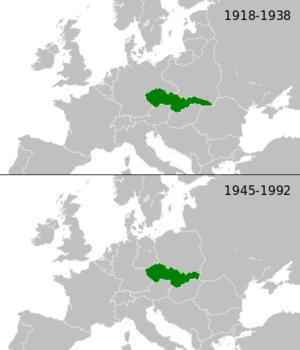Czechoslovakia
| Czechoslovakia |
|
(and Czechoslovakia's largest city) |
Source information is available at [ Sources ] |
Czechoslovakia was a sovereign state in Central Europe, created in October 1918, when it declared its independence from Austria-Hungary.
History
In 1938, after the Munich Agreement, the Sudetenland became part of Germany, while the country lost further territories to Hungary and Poland. Between 1939 and 1945, the state ceased to exist, as Slovakia proclaimed its independence, and subsequently, the remaining territories in the east became part of Hungary, while in the remainder of the Czech Lands, the German Protectorate of Bohemia and Moravia was proclaimed. In October 1939, after the outbreak of the Second World War, former Czechoslovak President Edvard Beneš formed a government-in-exile and sought recognition from the Allies.
After the end of the war, pre-1938 Czechoslovakia was reestablished, with the exception of Carpathian Ruthenia, which became part of the Ukrainian SSR (A Republic of the Soviet Union). From 1948 to 1989, Czechoslovakia was part of the Eastern Bloc with a command economy. Its economic status was formalized in membership of Comecon from 1949 and its defense status in the Warsaw Pact of May 1955. A period of political liberalization in 1968, known as the Prague Spring, was violently ended when the Soviet Union, assisted by some other Warsaw Pact countries, invaded Czechoslovakia. In 1989, as Marxist–Leninist governments and communism were ending all over Europe, Czechoslovakia peacefully deposed their socialist government in the Velvet Revolution; state price controls were removed after a period of preparation.
In January 1993, Czechoslovakia split into the two sovereign states of the Czech Republic and Slovakia.
Spanking in Czechoslovakia
Majority of Czech parents still use spanking as punishment, says new survey.[1]
The Czech Republic is among the last few countries in the EU that does not prohibit corporal punishment for children.
In 2015, the Council of Europe declared the Czech Republic in violation of the European Social Charter because the country had not fully banned corporal punishment.
Corporal punishment is defined as the disciplinary slapping or spanking of children by their parents.
A new survey conducted last month by research agency 'Nielsen / Admosphere' suggests that Czech attitudes toward physical punishment for children haven’t changed much in recent years.
The survey found that nearly two-thirds of Czech parents get physical, spanking, or slapping on the hand, when punishing kids.
A total of 63 percent of respondents said they would use or have used physical punishment when dealing with their kids’ “misbehavior,” which, according to the survey, was most often disobeying parents or grandparents or lying.
A total of 57 percent think that parents should have the right to use physical force in their children’s upbringing; more than half of respondents said that physical punishment should be part of education.
The Czech Republic is among the last few countries in the EU that do not prohibit corporal punishment for children.
A 2016 analysis of more than 50 years of research found that children who are spanked are more likely to defy their parents, develop mental health problems, and show antisocial behavior and aggression.
Around the world, 60 countries, states, and territories have adopted legislation that fully prohibits corporal punishment against children at home, according to UNICEF.
References
External links
Chat rooms • What links here • Copyright info • Contact information • Category:Root

